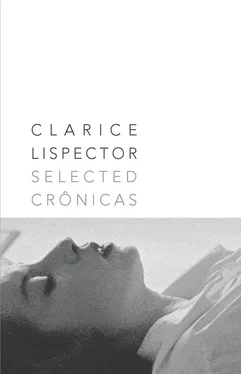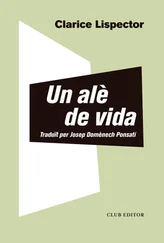Until that familiar noise comes through the door and the little boy, silent and intrigued by what a little boy can provoke, stops sobbing: Mummy. Mummy is: not to die. And he is reassured in the knowledge that he has a world to betray and to sell, and that he will sell it.
Yes, it is Mummy with a clean nappy in her hand. The minute he sees the nappy, he begins to sob once more.
— But you’re soaking wet!
The news alarms him, curiosity is reawakened, but now his curiosity is comfortable and guaranteed. He looks blindly at his own wetness and, in a new phase, looks at his Mummy. But suddenly, he stops and listens with his whole body, his heart pounding in his tummy: honk-honk! he recognizes the noise with a sudden cry of victory and terror — the little boy has just recognized something!
— That’s right! his mother says proudly, that’s right, my darling, honk-honk has just passed along the street, I shall tell Daddy what you’ve learned today, that’s just what it sounds like: honk-honk, my darling! his mother repeats, bouncing him up and down on her lap, lifting him by his legs, throwing him backwards, and then bouncing him up and down again. In all these postures, the little boy keeps his eyes wide open. They are as dry as a fresh nappy.
She was sobbing. And as if the bright glare of the afternoon were not enough, she had red hair.
In the empty street, the stones vibrated with heat — the little girl’s head was aflame. Seated on the steps in front of the house, she was bearing up. The street was deserted except for a solitary figure waiting in vain at the tram-stop. As if her submissive and patient gaze were not enough, her sobs kept coming back, causing her chin to tremble as it rested meekly on one hand. What was to be done with a sobbing little girl with red hair? We looked at each other in silence, dismay confronting dismay. In the deserted street there was no sign of a taxi. In a land of brunettes, to have red hair was an involuntary act of rebellion. Who cared if one day this red hair of hers would cause her to raise her woman’s head with an air of defiance? For the present, she was seated on the doorstep which was sparkling under a hot sun at two o’clock in the afternoon. What saved her was a woman’s discarded handbag, with a broken strap. She held it as if experienced in conjugal love, pressing it to her knees.
At that moment she was approached by her other half in this world, a soul-mate in Grajaú. The possibility of communication arose on a street-corner in a haze of sweltering heat; accompanying a woman and embodied in the image of a dog. It was a beautiful and wretched little basset-hound, sweet beneath the spell of its destiny. It was a red-haired basset.
There he came, trotting, ahead of his owner, dragging that long body of his. Suspecting nothing, tame dog.
The little girl opened her eyes in astonishment. Gently prepared, the dog stopped in his tracks before her. His tongue quivered. They eyed each other.
Among so many creatures who are ready to become the owners of another creature, there was the little girl who had come into this world to possess that dog. He trembled nervously without barking. She looked at him from under her fringe, spellbound and solemn. They seemed to be there for ages. A great sob shook her whole body as she watched him defiantly. The basset did not so much as flinch. She, too, overcame her sobbing and continued to stare at him.
Both of them had short, red hair.
What did they have to say to each other? No one knows. All we know is that they communicated rapidly with each other, for there was no time to lose. We also know that, without speaking, they entreated each other. They entreated each other with urgency, embarrassment and surprise.
Trapped among so many vague obstacles under that hot sun, there was the solution for the red-haired girl. And among so many streets to be trotted, so many bigger dogs, and so many dry sewers — there was a little girl like the flesh of his own red flesh. They stared hard at each other, infatuated, remote from Grajaú. Another second and their hovering dream would shatter, yielding perhaps to the solemnity with which they entreated each other.
But they were both pledged. He to his imprisoned nature. She to her impossible childhood, the centre of that innocence which could only open out when she became a woman.
The dog’s owner waited impatiently beneath her parasol. The red-haired basset finally detached himself from the little girl and trotted off as if in a dream. She remained there terrified, holding on to this encounter, stunned into a silence which neither a father nor a mother could understand. She accompanied the basset with black eyes, watching him in disbelief, slumped over the handbag pressed against her knees, until she saw him disappear round the next corner.
But he was stronger than she was. He did not look back even once.
Oh, if I had only known. I would never have been born, oh, if I had only known, I would never have been born. Madness borders on the most humiliating wisdom. By absorbing madness, I became quietly hallucinated. The glass ring you gave me shattered into pieces but love did not end there. It was replaced by the hatred of those who love. For me, the chair is an object. Useless so long as I am looking at it. What is the time, please, so that I may know if I am living this moment? Creativity stems from some origin but today it eludes me and all I have is this incipient madness which is in itself a valid creation. I have no further interest in valid things. I am liberated or lost. I shall let you into a secret: life is mortal. We conveniently suppress this secret otherwise we should make each instant mortal. Ibrahim Sued claimed to be an unrobed member of the French Academy. As an object, the chair has always interested me. This one in the Empire style is an antique bought from an antique dealer in Berne. It would be difficult to envisage simpler lines, in contrast with the red upholstery. I love objects in so far as they do not love me. If I do not know what I am talking about, I am not to blame. I must talk because talking can be one’s salvation. Yet I do not have a single word to say. The words already spoken have sealed my lips. What does one person say to another? Apart from ‘How are you?’ If people were suddenly to start being frank, what might they say to each other? Not to mention what they might say to themselves. But it would mean salvation, even though frankness is determined at a conscious level, and any horror of frankness comes from the part it plays in this vast unconsciousness which binds us to the world and to the world’s creative unconsciousness. Tonight there will be stars in the sky: as promised by this sad evening which could be saved by a human voice. The most awful blindness is that of people who do not know they are blind. I open my eyes wide but it is useless: I can only see. But I neither see nor feel what is secret. The gramophone is broken, it is costly to mend, and to live without music is to betray the human condition which is surrounded by music. Besides, music is an abstraction of thought, I refer to the music of Bach, Vivaldi and Handel. That Sweet Embrace , how that song gets on my nerves with its cloying words of affection. I can only write if I am free, and free of criticism, otherwise I give up. I look at the chair in the Empire style but this time I fancy it has been watching me. The future is mine so long as I am living. In future, there will be more time for living, and haphazardly for writing. In future, one will say: If I had known, I would never have been born. Marly de Oliveira, I scarcely ever write to you because I only know how to be intimate. I only know how to be intimate, whatever the circumstances: therefore I tend to be silent. Will we one day achieve all the things we have never done? Future technology threatens to destroy all that is human in man, but technology cannot touch madness: and so that is where all that is human in man can take refuge. I see flowers in a vase: they are wild flowers and were planted by no one. They are yellow and beautiful. But all my cook could say was: What ugly flowers. Simply because it is difficult to understand and appreciate anything which is spontaneous and austere. To understand complicated things is no advantage, but to love things which invite love is to progress up the human ladder. I am forced into telling so many lies. But I refuse to be obliged to lie to myself. For what would that leave me? Truth is the residue of all things and in my unconscious lurks the world’s truth. The moon, as Paul Eluard once described it, is éclatante de silence. Who knows if we shall see the moon tonight for it is already late and there is nothing to be seen in the sky. I once accompanied my father to a spa in Minas Gerais. I looked up at the night sky, turning my head as I looked upwards, and the sight of all those stars made me feel quite dizzy. For there in the open countryside the sky is clear. If one thinks about it, there is no logic in the perfectly balanced illogicality of nature. And the same is true of human nature. What would become of the world or the universe if man did not exist? If I could always write as I am writing now, I would be in that mental turmoil people call a brainstorm. Who could have invented the chair? Someone who cared for himself. So he invented something for his greater comfort. The centuries passed and no one took any more notice of the chair which people take for granted. It takes courage to have a brainstorm: one can never tell what might turn up and give us a fright. The sacred monster died and in its place a little girl was born who lost her mother. I really must break off at this point not because words fail me, but because these are things, not to mention the ones I only thought about, which I never put into words. And things one does not publish in newspapers.
Читать дальше












